
Die Libelle (The Dragonfly) Op. 204 is a polka-mazurka composed by Josef Strauss in 1866. [1]

Die Libelle (The Dragonfly) Op. 204 is a polka-mazurka composed by Josef Strauss in 1866. [1]
Josef Strauss and his wife Caroline visited Traunstein and lake Traunsee in 1866. At that time, Josef saw dragonflies flying on the water surface. Inspired by this experience, he composed the polka-mazurka Die Libelle.
This work was premiered on 21 October 1866, immediately after the Austro-Prussian War, when the Austrian mood was still gloomy following its defeat.
Die Libelle was recorded by Johannes Brahms, together with his own Hungarian Dance no. 1 in 1889. The recording was severely damaged in World War II.
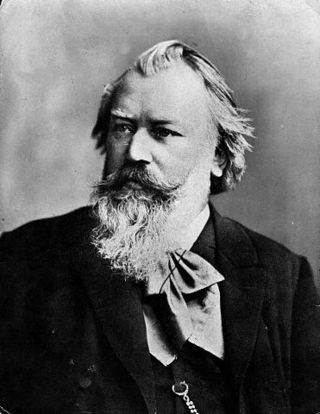
Johannes Brahms was a German composer, pianist, and conductor of the mid-Romantic period. Born in Hamburg into a Lutheran family, he spent much of his professional life in Vienna. He is sometimes grouped with Johann Sebastian Bach and Ludwig van Beethoven as one of the "Three Bs" of music, a comment originally made by the nineteenth-century conductor Hans von Bülow.

Polka is a dance and genre of dance music originating in nineteenth-century Bohemia, now part of the Czech Republic. Though associated with Czech and Polish culture, polka is popular throughout Europe and the Americas.
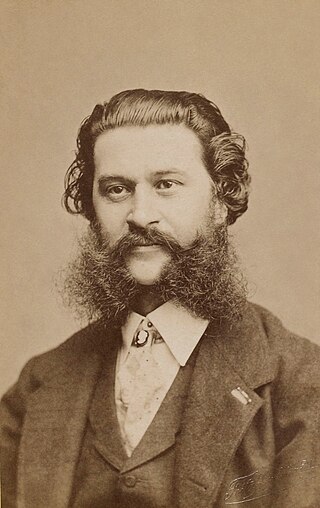
Johann Baptist Strauss II, also known as Johann Strauss Jr., the Younger or the Son, was an Austrian composer of light music, particularly dance music and operettas as well as a violinist. He composed over 500 waltzes, polkas, quadrilles, and other types of dance music, as well as several operettas and a ballet. In his lifetime, he was known as "The Waltz King", and was largely responsible for the popularity of the waltz in Vienna during the 19th century. Some of Johann Strauss's most famous works include "The Blue Danube", "Kaiser-Walzer", "Tales from the Vienna Woods", "Frühlingsstimmen", and the "Tritsch-Tratsch-Polka". Among his operettas, Die Fledermaus and Der Zigeunerbaron are the best known.
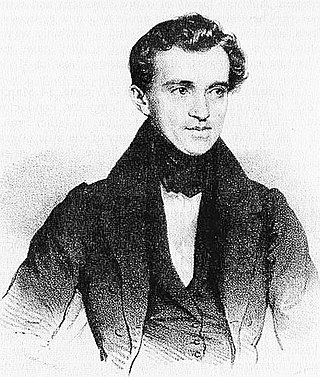
Johann Baptist Strauss I, also known as Johann Strauss Sr., the Elder or the Father, was an Austrian composer of the Romantic Period. He was famous for his light music, namely waltzes, polkas, and galops, which he popularized alongside Joseph Lanner, thereby setting the foundations for his sons—Johann, Josef and Eduard—to carry on his musical dynasty. He is best known for his composition of the Radetzky March.
The polka-mazurka is a dance, musically similar to the mazurka, but danced much like the polka. Many polka-mazurkas were composed by Johann Strauss II and his family. Johann Strauss I did not compose any of this type of music; the first polka-mazurka example written by the Strauss family was in the year 1854 by Johann Strauss II, entitled La Viennoise op. 144.The polka-mazurka was not credited to the Strauss family alone, as many Viennese composers in the 1850s era also wrote many examples. This variant of the polka was seen as cross-cultural, as many of its influences can be seen in the French-polka with its feminine and deliberate steps as well as the exciting schnell-polka, where Eduard Strauss composed many famous pieces of this type.

Josef Strauss was an Austrian composer.
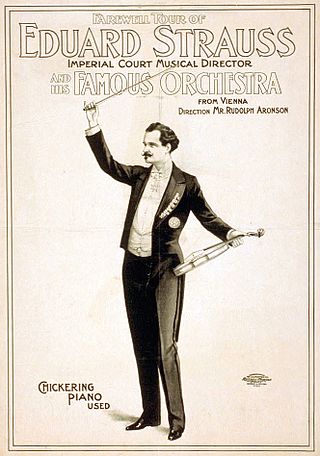
Eduard "Edi" Strauss was an Austrian composer who, together with his brothers Johann Strauss II and Josef Strauss made up the Strauss musical dynasty. He was the son of Johann Strauss I and Maria Anna Streim. The family dominated the Viennese light music world for decades, creating many waltzes and polkas for many Austrian nobility as well as dance-music enthusiasts around Europe. He was affectionately known in his family as 'Edi'.

Johann Maria Eduard Strauss III was an Austrian composer whose father was Eduard Strauss, whose uncles were Johann Strauss II and Josef Strauss, and whose grandfather was Johann Strauss I. Born in Vienna, he was unofficially entrusted with the task of upholding his family's tradition after the dissolution of the Strauss Orchestra by his father in 1901. His talents were not fully realized during his lifetime as musical tastes had changed in the Silver Age with more popular composers such as Franz Lehár and Oscar Straus dominating the Viennese musical scene with their operettas, although his uncle, Johann Strauss II, supervised his development as a musician, a fact disputed by Eduard Strauss.
Ein Herz, ein Sinn! , opus 323 is a polka-mazurka composed by Johann Strauss II in 1868 belonging to a period of creativity of the composer. Strauss dedicated this piece to 'the Committee of the Citizen's Ball' which was held at the Imperial Redoutensaal on 11 February 1868 where on occasion he had earlier also dedicated his waltz Bürgersinn.
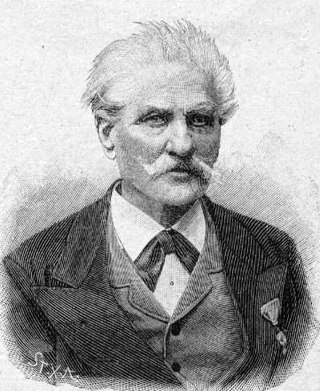
Joseph Gungl, correct: Josef Gung'l, was a Hungarian composer, bandmaster, and conductor. He was soprano Virginia Naumann-Gungl's father.
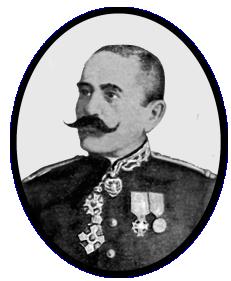
Ion Ivanovici was a Romanian military band conductor and composer of Banat Serbian origin, best remembered today for his waltz Waves of the Danube.
Libelle may refer to:

Karel Kovařovic was a Czech composer and conductor from Prague.

František Alois Drdla was a prominent Czech concert violinist and composer of light music.
Charles Émile Waldteufel was a French pianist, conductor and composer known for his numerous popular salon pieces.
Oscar Fetrás was a German composer of popular dance music, military marches, piano pieces and arrangements.
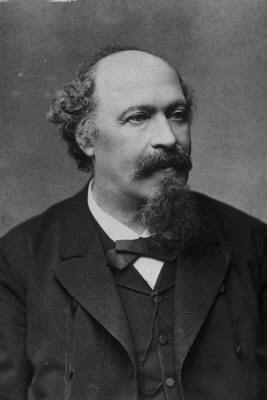
Dorfschwalben aus Österreich, Op. 164, is a Viennese waltz composed by Josef Strauss in 1864 or 1865.
Frauenherz op. 166 is a polka-mazurka composed by Josef Strauss in 1864 (1865?).